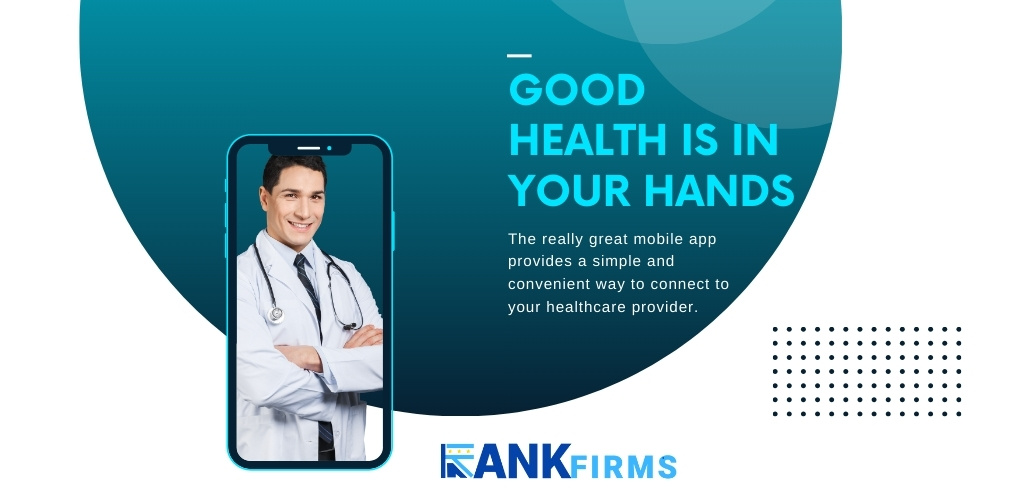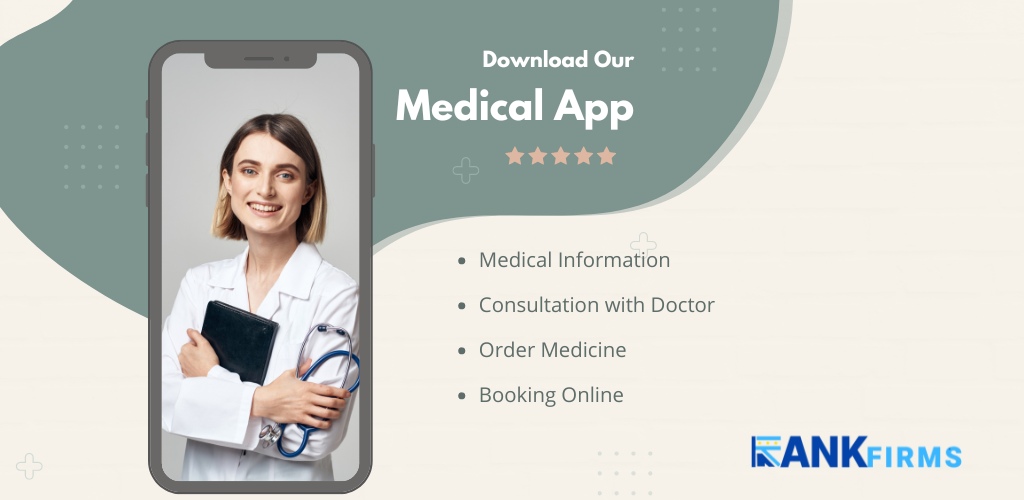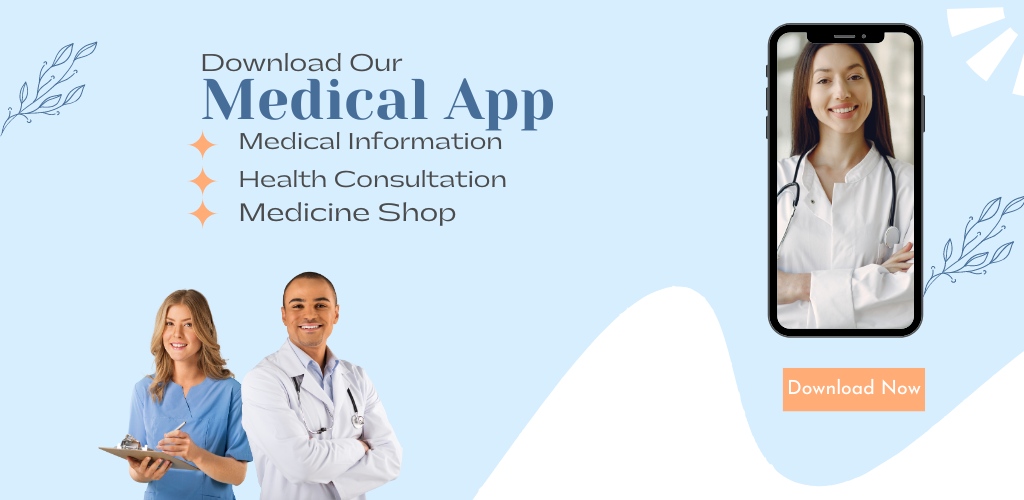In today’s digital age, healthcare apps have emerged as powerful tools for improving patient care, enhancing medical services, and revolutionizing the healthcare industry as a whole. With the increasing demand for convenient and accessible healthcare solutions, entrepreneurs have a unique opportunity to develop innovative healthcare apps that address various needs and challenges.
Before moving to healthcare application development ideas, let’s quickly look at the statistics and understand how worthy it is to invest in developing them.
Here are some relevant and latest statistics about the benefits of healthcare apps, along with information about the global market share of healthcare applications:
| Benefit | Source |
| Improved Patient Engagement | According to a survey by Accenture, 66% of patients believe that mobile apps improve their overall healthcare experience. |
| Enhanced Access to Healthcare | Research conducted by Statista reveals that as of 2022, 82% of U.S. consumers have used a healthcare mobile app to access medical information, schedule appointments, or communicate with healthcare professionals remotely. |
| Better Health Management | A study published in the Journal of Medical Internet Research found that patients who use healthcare apps for managing chronic conditions, such as diabetes or hypertension, experienced improved medication adherence, better symptom management, and enhanced overall health outcomes. |
| Cost Savings | Research by IQVIA Institute for Human Data Science suggests that the adoption of digital health technologies, including healthcare apps, could save the U.S. healthcare system up to $150 billion annually by improving medication adherence, reducing hospital readmissions, and facilitating remote patient monitoring. |
| Increased Efficiency for Healthcare Providers | A report by HIMSS (Healthcare Information and Management Systems Society) indicates that healthcare providers who incorporate mobile health technologies into their practices experience increased efficiency, reduced administrative burdens, and improved communication with patients, leading to better clinical |
As for the market share of healthcare applications globally and the investment potential, here’s an overview:
Let’s move to the top app development ideas that the healthcare industry can look at. Always remember to consider only the most reliable healthcare app development companies in order to get the best of your idea.
Top 30+ Healthcare App Development Ideas That Are Inspiring

Here are over 30 healthcare app development ideas to inspire entrepreneurs looking to make a difference in the healthcare sector:
1. Telemedicine App:
This platform allows patients to consult with healthcare professionals remotely, providing convenient access to medical advice and treatment. Telemedicine apps enable users to schedule virtual appointments, have video consultations, and even receive prescriptions electronically. These apps are particularly beneficial for patients with mobility issues, those living in remote areas, or individuals seeking immediate medical assistance without the need for in-person visits.
2. Appointment Scheduling App:
This app simplifies the process of scheduling appointments with doctors, specialists, and healthcare facilities. Users can view available appointment slots, book appointments based on their preferences, receive reminders, and even reschedule or cancel appointments as needed. By streamlining the appointment booking process, these apps reduce wait times, minimize no-shows, and improve overall patient satisfaction.
3. Medication Reminder App:
This app helps users manage their medications by sending reminders for dosage times and refills. Users can set up personalized medication schedules, receive notifications when it’s time to take their medications and track their adherence over time. Medication reminder apps help prevent missed doses, reduce medication errors, and improve medication adherence, particularly for individuals with chronic conditions or complex medication regimens.
4. Health Tracker App:
One of the trending apps used and developed by mobile app development companies, this app enables users to track their health metrics such as exercise, diet, sleep, and vital signs for better health management. Users can input data manually or sync with wearable devices and fitness trackers to monitor their progress, set goals, and receive insights into their health habits. Health tracker apps empower users to take proactive steps towards improving their overall health and well-being by providing personalized feedback and recommendations.
5. Symptom Checker App:
This app allows users to input their symptoms and receive suggestions for potential diagnoses or next steps. Symptom checker apps use algorithms to analyze user-provided information and provide relevant medical advice or recommendations, such as seeking immediate medical attention or scheduling a doctor’s appointment. While not a substitute for professional medical diagnosis, these apps can help users make informed decisions about their health and seek appropriate care when needed.
6. Fitness App:
This app offers personalized workout plans, exercise tracking, and health tips to help users achieve their fitness goals. Fitness apps provide users with access to a variety of exercise routines, ranging from cardio and strength training to yoga and meditation. Users can track their workouts, monitor their progress, and receive motivation and encouragement to stay active and healthy. With features such as workout videos, progress tracking, and social sharing, fitness apps make it easier for users to stay motivated and engaged in their fitness journey.
7. Mental Health App:
This app provides resources, support, and tools for managing mental health conditions such as anxiety, depression, and stress. Mental health apps offer a range of features, including mood tracking, meditation exercises, cognitive-behavioral therapy (CBT) techniques, and access to licensed therapists or counselors. These apps empower users to take control of their mental well-being, improve coping skills, and seek support when needed, thereby reducing stigma and barriers to accessing mental health care.
8. Diet and Nutrition App:
One of the most commonly developed by IT services companies and used, this app offers personalized meal plans, nutritional information, and calorie tracking to promote healthy eating habits. Diet and nutrition apps help users make informed food choices, track their daily intake, and achieve their dietary goals, whether it’s weight loss, weight maintenance, or overall health improvement. With features such as food logging, recipe databases, and meal planning tools, these apps make it easier for users to adopt healthy eating habits and maintain a balanced diet.
9. Women’s Health App:
This app is specifically designed for women’s health needs, including menstrual tracking, fertility tracking, and pregnancy monitoring. Women’s health apps enable users to track their menstrual cycles, ovulation dates, and fertility windows, as well as monitor pregnancy milestones and receive personalized health insights. These apps empower women to better understand their reproductive health, plan pregnancies, and manage their overall well-being throughout different stages of life.
10. Senior Care App:
This app provides services and support for elderly individuals, including medication reminders, caregiver coordination, and emergency assistance. Senior care apps offer features such as medication management, appointment scheduling, remote monitoring, and emergency response systems to support aging in place and ensure the safety and well-being of older adults. These apps help seniors maintain their independence, stay connected with caregivers and loved ones, and access the assistance they need to live comfortably and securely.
11. Chronic Disease Management App:
This app helps users manage chronic conditions such as diabetes, hypertension, and asthma through medication tracking, symptom monitoring, and lifestyle management tools. Chronic disease management apps enable users to track their health metrics, receive medication reminders, log symptoms, and monitor trends over time. By empowering users to actively manage their conditions, these apps can improve health outcomes, reduce complications, and enhance the quality of life for individuals living with chronic diseases.
12. Medical Education App:
This app offers medical professionals access to educational resources, training modules, and continuing medical education (CME) courses. Medical education apps provide a convenient platform for healthcare professionals to stay updated on the latest medical research, guidelines, and best practices. These apps may include interactive courses, virtual simulations, and peer-reviewed journals to support lifelong learning and professional development in the healthcare field.

13. Healthcare Marketplace App:
This platform connects users with healthcare providers, pharmacies, and medical suppliers for convenient access to services and products. Healthcare marketplace apps offer a one-stop solution for users to find and book appointments with healthcare professionals, order prescription medications, purchase medical supplies, and access telemedicine services. By aggregating healthcare services and products in one place, these apps simplify the healthcare journey for users and promote transparency and choice in healthcare decision-making.
14. Medical Records Management App:
This app allows users to securely store and access their medical records, test results, and health history on their mobile devices. Medical records management apps enable users to digitize and organize their health information, making it easily accessible whenever needed. These apps may also support features such as appointment reminders, medication lists, and emergency contact information to enhance care coordination and improve patient-provider communication.
15. Virtual Reality Healthcare App:
This app utilizes virtual reality technology for medical training, patient education, and pain management therapies. Virtual reality healthcare apps create immersive experiences that simulate medical procedures, anatomy visualization, and therapeutic interventions. These apps can be used for medical education and training purposes, patient education and empowerment, and non-pharmacological pain management techniques, offering a novel approach to improving healthcare delivery and outcomes.
16. Remote Patient Monitoring App:
This app enables healthcare providers to remotely monitor patients’ health metrics and vital signs for early detection of health issues. Remote patient monitoring apps use connected devices, wearables, and sensors to collect real-time health data from patients in their homes or other settings. Healthcare providers can monitor patients’ conditions, detect changes or abnormalities, and intervene proactively to prevent complications or hospitalizations. Remote patient monitoring apps offer a cost-effective and efficient way to deliver personalized care and support patients with chronic conditions or post-acute care needs.
17. Health Insurance Management App:
This app helps users manage their health insurance coverage, claims, and benefits, providing transparency and convenience. Health insurance management apps enable users to view their insurance policy details, track claims status, and access digital insurance cards on their smartphones. These apps may also offer features such as provider directories, cost estimators, and coverage eligibility checks to help users make informed decisions about their healthcare coverage and expenses.
18. Allergy Management App:
This app helps users identify and manage allergies, including tracking allergen exposure, medication reminders, and emergency protocols. Allergy management apps provide personalized allergy profiles based on users’ allergy triggers, symptoms, and treatment plans. Users can log their allergy symptoms, track environmental exposures, and receive alerts for pollen counts or air quality changes. These apps also offer educational resources, emergency contact information, and allergy action plans to help users manage allergic reactions effectively and stay safe.
19. Prescription Delivery App:
This app allows users to order prescription medications online and have them delivered directly to their doorstep for added convenience. Prescription delivery apps partner with pharmacies or healthcare providers to offer seamless medication ordering and delivery services. Users can upload their prescriptions, choose delivery options, and track the status of their orders in real-time. These apps provide a convenient alternative to traditional pharmacy visits, particularly for individuals with mobility limitations, chronic illnesses, or busy lifestyles.
20. Emergency Response App:
This app provides users with quick access to emergency services, including ambulance dispatch, first aid instructions, and medical history sharing. Emergency response apps enable users to call for help with the tap of a button, providing their location and essential medical information to emergency responders. These apps may also offer features such as CPR instructions, automated external defibrillator (AED) locators, and emergency contact alerts to support timely and effective emergency care.
21. Sleep Tracking App:
This app tracks users’ sleep patterns and provides insights and recommendations for improving sleep quality and duration. Sleep tracking apps use sensors or wearable devices to monitor users’ sleep stages, including light sleep, deep sleep, and REM sleep. Users can view their sleep data, track trends over time, and receive personalized sleep hygiene tips and recommendations to optimize their sleep habits and overall well-being.
22. Health Chatbot App:
This app utilizes artificial intelligence to provide users with personalized health advice, answer medical questions, and offer support. Health chatbot apps use natural language processing and machine learning algorithms to understand users’ queries and provide relevant and accurate responses. Users can chat with the chatbot to get information about symptoms, medications, treatment options, and general health tips. These apps offer a convenient and accessible way for users to seek health-related information and support anytime, anywhere.
23. Rehabilitation Therapy App:
This app provides exercises, guidance, and progress tracking for individuals undergoing physical therapy or rehabilitation. Rehabilitation therapy apps offer personalized exercise programs tailored to users’ specific conditions, injuries, or rehabilitation goals. Users can access instructional videos, perform exercises at home or in clinical settings, and track their progress over time. These apps facilitate remote monitoring and communication between patients and therapists, enabling continuity of care and enhancing rehabilitation outcomes.
24. Health Gamification App:
This app uses gamification techniques to motivate users to adopt healthier habits, such as exercise challenges and wellness competitions. Health gamification apps leverage game mechanics, rewards, and social incentives to engage users in health-promoting behaviors and sustain long-term behavior change. Users can participate in challenges, earn points or rewards for achieving health goals, and compete with friends or peers to stay motivated and accountable. These apps make health and wellness fun, social, and interactive, leading to improved adherence and outcomes.
25. Medical Tourism App:
This app helps users plan and book medical treatments and procedures abroad, including travel arrangements and accommodation. Medical tourism apps provide information about healthcare facilities, services, and providers in destination countries, as well as cost estimates, patient reviews, and travel tips. Users can compare options, schedule appointments, and make travel arrangements seamlessly through the app. These apps offer a convenient and cost-effective way for users to access high-quality medical care and explore healthcare options beyond their local area.
26. Immunization Tracking App:
This app helps users keep track of their vaccination history, schedule immunizations, and receive reminders for upcoming doses. Immunization tracking apps enable users to maintain digital records of their immunization status, including vaccine types, dates, and dosage information. Users can receive notifications when vaccines are due, view vaccination schedules recommended by health authorities, and access educational resources about vaccines and immunization. These apps promote vaccination adherence and help ensure individuals stay up-to-date with recommended immunizations to protect against vaccine-preventable diseases.
27. Medical Expense Management App:
This app allows users to track and manage their medical expenses, including insurance claims, out-of-pocket costs, and reimbursement requests. Medical expense management apps help users keep track of healthcare-related expenses, including doctor visits, prescriptions, medical procedures, and insurance premiums. Users can capture receipts, categorize expenses, and generate expense reports for reimbursement or tax purposes. These apps offer financial transparency and control, helping users make informed decisions about their healthcare spending and manage their healthcare finances effectively.
28. Health Community App:
This app connects users with similar health conditions or interests, enabling peer support, information sharing, and community engagement. Health community apps provide a platform for users to share experiences, ask questions, and receive support from others facing similar health challenges. Users can join groups, participate in discussions, and access resources and educational content relevant to their health needs. These apps foster a sense of belonging, reduce isolation, and empower users to take an active role in managing their health and well-being within a supportive community.
29. Elderly Care Coordination App:
This app facilitates communication and coordination among caregivers, family members, and healthcare professionals involved in elderly care. Elderly care coordination apps offer features such as shared calendars, task lists, medication reminders, and secure messaging to streamline care coordination and collaboration. Users can coordinate caregiving responsibilities, share updates and information, and coordinate appointments and services for elderly loved ones. These apps promote transparency, efficiency, and continuity of care, enhancing the quality of life and well-being of elderly individuals and their caregivers.
30. Personalized Medicine App:
This app utilizes genetic data and personalized health information to offer tailored treatment plans and medication recommendations. Personalized medicine apps analyze users’ genetic profiles, health history, lifestyle factors, and preferences to generate personalized treatment recommendations and medication regimens. Users can access information about genetic predispositions, medication efficacy, and potential drug interactions to make informed decisions about their healthcare. These apps enable precision medicine approaches, optimize treatment outcomes, and improve patient satisfaction and adherence.
31. Disaster Response App:
This app provides real-time updates, emergency resources, and communication tools during natural disasters or public health emergencies. Disaster response apps offer features such as emergency alerts, evacuation routes, shelter locations, and safety tips to help users prepare for and respond to emergencies effectively. Users can access critical information, report emergencies, and communicate with emergency responders and authorities for assistance. These apps empower individuals and communities to stay safe and resilient in the face of disasters and emergencies.
32. Medical Device Integration App:
This app integrates with wearable devices, medical sensors, and monitoring equipment to provide users with actionable health insights and alerts. Medical device integration apps collect and analyze data from connected devices, such as fitness trackers, blood glucose monitors, and heart rate monitors, to monitor users’ health status and trends. Users can view real-time data, track changes over time, and receive personalized health recommendations based on their device data. These apps enable continuous monitoring, early detection of health issues, and proactive management of chronic conditions, improving overall health outcomes and quality of life.

In Conclusion –
These healthcare app development ideas highlight the diverse range of opportunities for entrepreneurs to leverage technology to address various healthcare needs and challenges. By developing innovative mobile solutions, entrepreneurs can make a significant impact on healthcare delivery, patient outcomes, and overall well-being.
Whether it’s improving access to care, enhancing patient engagement, or promoting healthy behaviors, healthcare apps have the potential to transform the healthcare landscape and improve the lives of individuals worldwide. Hence it is important to collaborate with a professional and expert software development company to provide a lucrative yet highly interactive healthcare app.
Recommended Articles
- https://www.rankfirms.com/elearning-software-development-ideas/
- https://www.rankfirms.com/how-to-discover-the-best-web-design-company/
- https://www.rankfirms.com/innovative-ai-business-ideas-entrepreneurs/
- https://www.rankfirms.com/website-development-ideas-startup/
- https://www.rankfirms.com/creative-strategies-e-commerce-business-ideas-startup/




